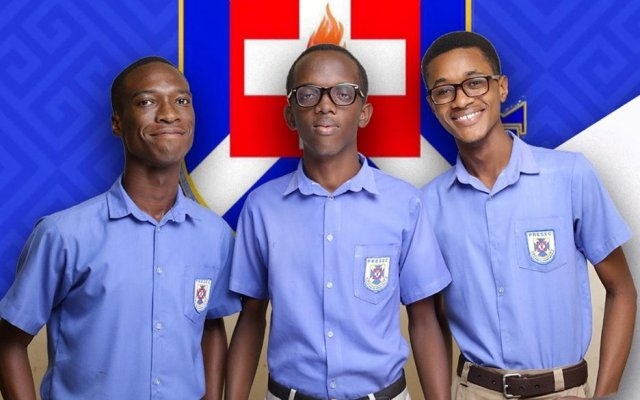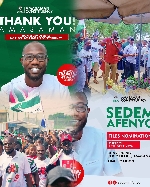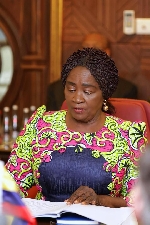Presec, NSMQ and the problem of the day

On Thursday, before the quiz, we visited PRESEC, five-time winner of the quiz and now eight times finalists to see the sanitation situation there.
Fasten your seat belts for the facts are not pleasant.
Right behind the administration block and close to the Science labs and the classroom blocks is a huge refuse dump, adjoining a toilet. By toilet, we mean a urinal, without water closets.
There was open defecation on the urinal floor.
“The teachers always tell us to stop coming here but from time to time students come and defecate inside,” said KWH, a first-year student. “They have made a plan that every week a designated class will come and clean the place.”
That same morning the Ghana Health Service announced the new poliomyelitis Type -2 virus discovery in Ghana.
Our focus at PRESEC then was to ask Biology students about what relevance the NSMQ has on them and their view of the rubbish dump and urinal.
It was not difficult to find interviewees as droves of boys arrived in twos or threes and urinated just outside the urinal either to the left or right of the urinal and the adjoining rubbish dump.
We were later stopped by two male teachers. “Their parents have put them into our hands to protect them,” said one, who denied us further interaction with the boys and declined to engage us in an interview on the subject of Biology, pointing us to the administration instead.
Meanwhile, some students told us the main/bigger rubbish dump is between Mangoase (an open eating place) and House Eight.
Two female staff after having established our credentials were happy to engage us.
“Did you check to see if the water was flowing?” Ms J asked. “Water is the main problem. I think if there is water flowing the problem can be solved.”
She urged us to go back and check but of course we were in no mood to touch the tap handles of that urinal hand basin.
“Have you been inside there before?” I asked them.”
“No,” came the reply.
I then described the place to them. The urinal is an open continuous three-metre tiled floor with nine shower holes where students are expected to stand next to each other and urinate onto the floor. The urine will then find its way into the shower holes.
“There is no way one will not scatter urine on another,” I ended.
We were told David Odjidja, the new headmaster arrived only several weeks ago; is very affable and listens to everyone.
During our visit however, he was seated at the National Theatre awaiting the start of the quiz.
“What is the relevance of winning the NSMQ,” I punched.
“If you win it…..,” I started.
“And so what?” Ms J continued. “Will it bring water to the toilet?”
When the quiz started, Dr Elsie Effah Kaufmann, the quiz host stated, “You know, our contestants in the final we expect them to be changing the world. What will you like to be in future?”
“I will like to be a mechanical engineer,” came a reply from a contestant.
Thence followed the PRESEC anthem, “….to take our places in the future of our country and church,” the clearer parts as heard on radio.
The first round was dubbed “Fundamental Concepts”.
The NSMQ is currently designed for final year students who sat their WASSCE in April and have been given extra preparation by the teachers of their alma mater.
The quiz period lasting several weeks brings class hours to a standstill as advertisers, old students, Ghana Education Service, sponsors including private universities and fertility clinics, and media houses enter into a national razzmatazz/jombolijo which does not address any existential problem.
Take Round Three for example, which features the Problem of the Day.
“What could be the reason for the relationship between advanced maternal age and Down’s Syndrome?” asked Dr Effah Kaufman for 10 points.
The noisy National Theatre (actually encouraged by the sponsors) had no interest in the most important biological threat dominating the day’s news or the practicality of the Problem of the Day – only the cheering, jeering and booing mattered. But come to think of it: What is “a feared science school”?
Does it exist? Do we teach science in ghana? Where and to what effect? Do we practice science?
The National Science and Math Quiz is all much ado about nothing. The usual ghana chew, pour and pass regimen.
“Why don’t the organisers rather create a National Science Project Award with the schools competing?” my mentor queries.
“The schools should come and present their projects in teams. The projects should be directed at solving a problem. After all are the exams that the children pass not quizzes?”
Meanwhile, the effect of a real problem of the day has been presented by Ministry of Health as part of a press statement released Thursday: “As part of measures to prevent further spread [of Polio Type 2 Virus] to humans, the general public is encouraged to observe improved personal hygiene and food sanitation practices including….wash your hands often with soap under safe running water…..after using the toilet facility; use toilet facility or bury your faeces; do not defecate in the open; clean toilet surfaces contaminated with faeces with disinfectants.”
But how do we bury our waste, create open rubbish dumps and dig boreholes for water at the same time?
Now where are the quiz hosts and the contestants?
Oh Lord; May the Light from Heaven guide us in the path of virtue and science.
Feedback; [email protected]; www.writersghana.com; LinkedIn, Isaac Ato Mensah; Instagram, @atomenswriters; Twitter, @Atomens; Facebook, Isaac Ato Mensah; Telegram, Isaac Ato Mensah; Quora, Isaac Ato Mensah. WhatsApp (+233) 020 022 0353.
Writers and Shakespeares Ghana Limited exist to be a moral and intellectual guide to the best practice of PR and integrated communications around the world, beginning with Ghana.
By: Isaac Ato Mensah
Source: David Apinga
Trending News

Health Minister receives report on Zipline Medical Drone Service
16:59
No apology, but diplomacy: Israel pushes back on Ghana claim
20:43
3 candidates in the race as EC schedules Kpandai rerun for Dec 30
19:57
Adu-Boahene case: Atta Akyea exposes inconsistencies in A-G witness’s EOCO testimony
06:45
Amasaman MP marks one-year anniversary of election victory, pledges accelerated development
06:46
NDC Legal Director thanks God for party’s election victory
03:36
Majority Leader withdraws Special Prosecutor repeal Bill after President Mahama’s appeal
16:34
VP Opoku-Agyemang eyes English-teaching opportunities in Colombia as language, cultural ties grow
11:26
Ghana deports 3 Israelis in retaliation, gov'ts commit to resolution
19:29
CID, BoG arrest 41 in Accra crackdown on illegal forex trading
22:25




